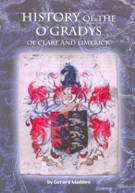History of the O’Gradys of Clare and Limerick
By Gerard Madden

The Celtic imagination produced a genealogy of 98 generations before Dungal who lived about 700 AD gave his name to Cinéal Donghaile the territory of the O’Gradys in north /east county Clare. Their patrimonial lands consisted of the modern parishes of Whitegate, Mountshannon, Scariff and Tuamgraney. This scenic region, at the foothills of the Sliabh Aughty Mountains, on the western shore of Lough Derg, bears ample testimony to their presence and influence. Lough O’Grady and Knockygrady commemorate the name. Their most impressive memorial is their Tower House situated in the village of Tuamgraney.
Gráda from whom O’Grady derives lived about 1,000 A.D and was a contemporary of Brian Boru.
The first recorded O’Grady was Anselis O’Grady who was killed at the Battle of Moinmore near Emly in County Tipperary in 1151. O ‘Grada means the grandson of the peace loving man. However Hart’s Irish Pedigrees gives a more interesting meaning. ie the descendants of the love making man.
The family has had a long association with St Cronan’s Church / Heritage centre in Tuamgraney. This was built before 964 A.D and is the oldest in continuous use in Ireland, England Scotland and Wales. From 1170 to 1184, Cenfaela O’Grady was both abbot of Tuamgraney and Chief of his name.
From 1276 to 1318 Civil war raged in Thomond between two rival factions of the O’Briens who became known as clan Brian Ruadh and clan Turlough. The East Clare tribes of O’Grady, O’Durack, O’Shanahan, O’Kennedy, O’Ahern, O’Hogan and many others supported Brian Ruadh and were defeated.
That the O’Gradys survived at all in east Clare is a miracle and their motto Vulneratus non Victus - wounded but not defeated, aptly describes their struggle. In any conflict it is the victors that invariably write the history and Shane Mac Rory McGrath wrote the history of this civil war as the Caithreim Thoirdealbhaigh or the Triumphs of Turlough. He gleefully wrote that the MacNamaras invaded O’Grady territory in 1278, and having accidentally came across the place where they kept their noble herds in a stockade -
They stormed the stone boolies and did grievious killing… the victors lump together O’Gradys preys and having taken so many as they got of their men, their fair haired women, their little boys and other members of their families, of their servants, kern, horseboys, and herdsmen, they made of them one universal litter of slaughter, a deed which will long live as the Carnage of Clare).
In 1314, the O’Gradys were again attacked by the MacNamaras aided by the O’Kellys and O’Maddens. Somewhere near Tuamgraney the O’Gradys had erected –
a massive fighting stockade of felled trees properly constructed… The enemy stormed the place and did grievous killing, women and boys and whole families included, whereby that murderous far secluded place became a mere heap of carnage thickly stacked. There in abundance they had young men lying on their faces, women in lamentation, kine that bellowed deafeningly, and by this red raid the MacNamaras effectively relieved the O’Gradys of all care in respect of their cattle and young people.
The O’Gradys of County Limerick are descended from Hugh O’Grady a son of Donald O’Grady chief of his name who was killed in County Clare in 1311. Hugh married a daughter of O Ciarmhaic in Knockainy in east Limerick. This name was anglicized to Kerwick and by false analogy to Kirby.
In 1991, East Clare Heritage hosted the first Clan gathering of the O’Gradys in over 400 years. Lt. Col. Gerald Vigors De Courcy O’Grady attended and addressed the gathering. The weekend was a great success and it was decided to form a Clan Association to promote and preserve the history and heritage of the Clan. The untimely death of ‘The O’Grady’ in 1993 was a huge loss and his commitment and encouragement has been sorely missed.
The present holder of the title, ‘The O’Grady of Kilballyowen,’ is Henry O’Grady who lives in London. His sister Elizabeth O’Grady Lloyd resides on the family estate at Kilballyowen, County Limerick.
It is my fervent hope that this publication will encourage O’Gradys worldwide to realize that they have an ancient and honorable heritage. Edmund Burke a leading political philosopher and orator of the 18th century said, ‘a man who is not proud of his ancestry will never leave after him anything, for which his posterity may be proud of him.’
Further details can be obtained from the author Gerard Madden at Scariff, County Clare or the East Clare Heritage Centre at Tuamgraney, Co. Clare.
Email eastclareheritage@eircom.net
Tel 061-921351
Email gerardmmadden@eircom.net
Tel 086-8749710